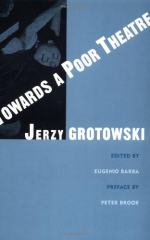
|
| Name: _________________________ | Period: ___________________ |
This quiz consists of 5 multiple choice and 5 short answer questions through The Actor's Technique.
Multiple Choice Questions
1. Who played the role of the Constant Prince in Grotowski's production of "The Constant Prince"?
(a) Stanislaw Scierski.
(b) Ryszard Cieslak.
(c) Rena Mirecka.
(d) Antoni Jaholkowski.
2. Grotowski states in "Theatre is an Encounter" that he gravitates toward the great romantic poets of Poland, but also to the works of Calderon and _____.
(a) Homer.
(b) Marlowe.
(c) Socrates.
(d) Shakespeare.
3. What is the name of the institute discussed in "Methodical Exploration"?
(a) Ross Institute.
(b) Maht Institute.
(c) Bryg Institute.
(d) Bohr Institute.
4. In "The Theatre's New Testament," Grotowski says, "The elaboration of artificiality is a question of _____ - sounds and gestures - which evoke associations in the psyche of the audience."
(a) Signals.
(b) Holograms.
(c) Archetypes.
(d) Ideograms.
5. Grotowski states in "Theatre is an Encounter" that the characters of the Odyssey are still actual because there are still _____.
(a) Heroes.
(b) Warriors.
(c) Pilgrims.
(d) Pirates.
Short Answer Questions
1. Who built his methods on the spontaneity of daily life, according to Grotowski in "The Actor's Technique"?
2. In "The Theatre's New Testament", Grotowski asserts that the work at The Laboratory has nothing to do with _____.
3. The cycle of exercises in "Stimulation of the Voice" from "Actor's Training (1966)," ends with _____.
4. In "The Theatre's New Testament," Grotowski says that it is "far less risky to be Mr. Smith all one's life than to be" _____.
5. How long in the play "Dr. Faustus" does Faustus have to live before his martyrdom of hell?
|
This section contains 250 words (approx. 1 page at 300 words per page) |

|




